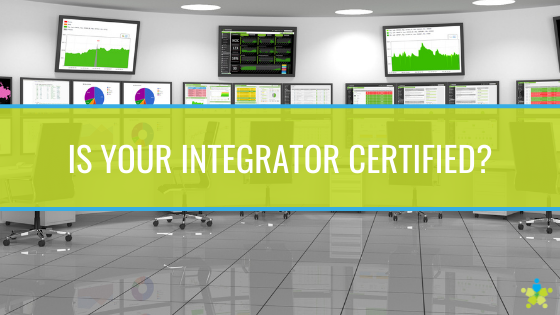[vc_row][vc_column][vc_column_text]
What does it mean for an AV integrator to be certified?
Certification is an important indicator of knowledge in many industries, including architecture, construction and IT. It’s also an important consideration when selecting an AV integrator because the industry is constantly adding new technologies and solutions. The rise of remote work and education has accelerated this growth, to the point where the number of available AV solutions is too much for most organizations to consider on their own. This is where a certified AV integrator comes in. On top of their broad industry expertise, certified AV integrators and technicians possess product-specific knowledge. With this extra knowhow, certified AV experts can accelerate a project’s timeline and ensure that every component is properly installed and configured, providing the ideal solution.[/vc_column_text][vc_column_text]Five reasons your integrator should be certified
There are several reasons why certification is a must if you’re considering an AV integrator. Here’s five of the top reasons:- Clean installation - Certified AV specialists know how to install AV equipment quickly and efficiently, so there’s no waste or unnecessary redundancy packaged with your AV solution. Some certification programs, like AVIXA’s CTS, train technicians to install a variety of standard AV technologies, while major AV vendors also have their own product-specific certifications, which also touch on installation. Ideally, the AV integrator you choose will be certified in all of the products your AV project includes. This ensures there will be no knowledge gaps that interfere with the solution’s performance. Certified technicians are also trained in pulling a variety of data and power cables, so they leave behind a tidy, organized form of cable management. When it’s time to upgrade or maintain the system, that clean organization will save time, which in turn saves money.
- Additional design capabilities - It’s rare for an out-of-the-box solution to provide everything a business or school needs. The room’s acoustics may pose a challenge, maybe there’s an older system already in place, or perhaps the solution can’t be easily scaled up. In almost every case, a custom solution will do a better job of meeting your organization’s needs. Certified AV integrators are able to design and install these custom solutions, in order to provide the perfect AV fit for your organization.
- Expert project management - System design and installation are critical parts of the integration process, but there’s more to it. AV projects include many components and miles of cabling and procuring all of that will take a lot of time if it isn’t handled by an AV expert. It’s also common for integrators to run into older system components when surveying the client’s site, and some measure of cleanup is typically needed when this is the case. A certified AV expert will be able to oversee this cleanup so there’s no leftover, obsolete equipment or cabling once the job is done. AV integrators learn how to perform these tasks during certification, so in addition to their installation and design knowledge, you’ll get specialized project management abilities.
- Ongoing support and maintenance - An AV integrator’s job isn’t over when installation is complete. As long as the solution is in place, it’s a good idea to monitor its performance and to monitor how people are utilizing the technology. With time, adjustments and maintenance will likely be needed, and a certified integrator will offer these ongoing services as part of the project. In effect, a certified AV integrator can be a long-term technology partner for their clients, catching performance issues before they cause significant downtime, pushing over updates, spotting potential upgrades when they are available, overseeing warranties and repairs, and providing guidance when it’s needed.
- Dedication to best industry practices - During AV certification, technicians are trained on the industry’s best practices, which ensures those technicians can provide reliable, efficient service to their clients. It takes time and money to attain certification, and before a technician is certified, their knowledge is rigorously tested. It’s no surprise, then, why so many organizations look for certification in their AV integrator. It’s a sign of commitment and trustworthiness.



